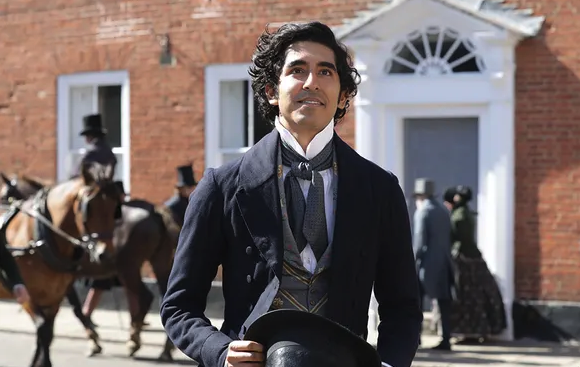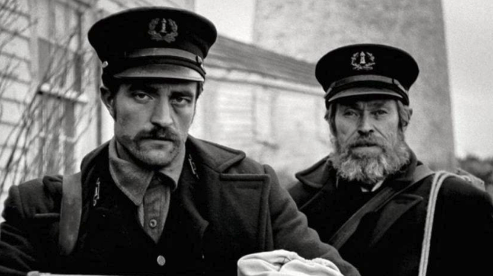The Personal History of David Copperfield

Cast: Dev Patel, Hugh Laurie, Tilda Swinton, Ben Wishaw, Peter Capaldi
Director: Armando Ianucci
119 mins
A delightful, occasionally clumsy but intriguing adaptation of Charles Dickens’s 1850 novel, David Copperfield – full original title “The Personal History, Adventures, Experience and Observation of David Copperfield the Younger of Blunderstone Rookery (Which He Never Meant to Publish on Any Account)” – director Armando Iannucci’s The Personal History of David Copperfield offers a spirited performance by Dev Patel in the title role and a rousing ensemble to back him up. Patel is almost overshadowed by newcomer Jairaj Varsani as his younger self, so engaging is the boy’s incarnation of “Master Davey.” Irrespective of who is on screen when, however, the film offers a rousingly good time, though at intervals it is inconsistent in its application of Iannucci’s trademark irreverent nuttiness. Those expecting full-on Armando manic material may come away wishing he had not pulled some stronger comic punches here, but there is still enough mayhem to entertain, and more. The plot is straight out of the book, more or less, though heightened in tone for humorous effect. Iannucci emphasises Copperfield’s imaginative flights of fancy with elaborate visuals, including projections on walls of flashback scenes remembered by the adult narrator (Patel) who walks (unseen), on occasion, among the figures from his past. Tilda Swinton, Hugh Laurie and Peter Capaldi all deliver hilarious supporting work as some of the characters important to our protagonist’s development, with Ben Whishaw an appropriately unctuous Uriah Heep. The cast is excellent, even if the script is not always up to their level of expertise, faltering as it does, at times, in its labyrinthine construction.
One of the more interesting aspects of the film is Iannucci’s decision to place actors of colour in prominent roles without regard to genetic logic (or notice by the characters). Beyond Patel, whose Indian background is never once addressed, there’s Benedict Wong as Mr. Wickfield and Rosalind Eleazar as his daughter Agnes, among others. When the film works, which is most of the time, shine they all do. Like his modern day namesake, this David Copperfield delivers plenty of magic.
THE LIGHTHOUSE

Cast: Willam Dafoe, Robert Pattinson
Director: Robert
Eggers
110 mins
Through an extraordinary, frightening duet between Robert Pattinson and Willam Dafoe in The Lighthouse, two sailors push one another to the brink of madness. Newly arrived at their destination, Thomas Wake (Dafoe) and Ephraim Winslow (Pattinson) arrive at this isolated locale and immediately get to work cleaning, maintaining and fixing up their new home. Everything comes in twos: two cups, two plates, two bowls, two beds. The pair work on the same schedule every day, only deviating when Thomas decides something different needs Ephraim’s attention. Like newlyweds sharing meals across from one another each morning and every evening, the men slowly begin to develop a relationship. Initially taking some time for either of them to speak. They’re both accustomed to working long days in relative silence. Both Dafoe and Pattinson bring a meditative quality to their characters. They may not possess the inner peace of a Zen monk, but their thought processes are singular and focused. Only the lighthouse and getting back to the mainland matters. Director Robert Eggers uses the sound of the wind and the ocean to create a soundscape of harsh conditions and natural quarantine. The first words spoken invoke a well-worn prayer, not for a happy life, or a fast working day, but to stave off death.
Fans of Eggers’ previous outing The Witch should not expect a similar experience during The Lighthouse, although themes of isolation, fluctuating relationship dynamics, repressed sexual desires, and light use of folklore to colour the edges of the story exist in both films. Shot in black and white with a 1.19 to 1 (square box) aspect ratio, the visual uniqueness may scare off some less adventurous viewers. But cinephiles, particularly those who crave masterful performances, should make time to see The Lighthouse in a cinema. In using 35mm film and that distinct aspect ratio, the director challenges Dafoe and Pattinson to play the dastardly villain, the stoic hero, and the damsel in distress. Early on, Eggers and co-writer Max Eggers establish a time limit, after which the men will be free from one another and the stress of the job. Thomas and Ephraim have a restrained relationship and clearly do not trust one another. The oblong lodging heightens the feeling that something is amiss between the men. The long and sometimes blinding shots of The Lighthouse evoke fear and suggest deceit. The editing and cinematography work together harmoniously to create an uneven pace and the black-and-white tones heighten the drastic difference between their drunken nights and the clear-headed mornings. Eliminating shadows allows for a breath after their late-night confessions and brawls. As the days begin to mesh, the editing picks up the pace, quickly transitioning from one point of view to the other. Without women, the men turn to their fantasies to manage their sexual desires. Ephraim holds close to a carving of a mermaid. The sea represents his escape from a troubled past as he dreams of seducing his mermaid, but she remains elusive. Trying to love this new life presents a unique difficulty. A demanding boss, Thomas doesn’t think anything Ephraim does measures up to the standards of his love, the lighthouse. He’s obsessed and refuses to allow the young man near the actual light structure. “She’s been a finer and quieter wife than any flesh-and-blood wife,” Thomas proclaims. Like a married couple, Thomas and Ephraim become more accustomed to one another’s moods, better at detecting lies, and the madness they’ve carefully hidden from one another. To add more madness to the mix, the men form a toxic relationship. Not a romantic relationship by any means, theirs is a bond built out of desperation for human contact. A visceral ride, The Lighthouse explores man’s relationship to the sea, specifically through the lens of backbreaking work. At times both men are manager and worker, partners, enemies, father and son, competitors, master and pet, and victim and abuser. The film is captivating, frightening and thought-provoking.